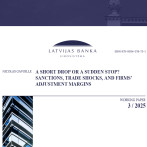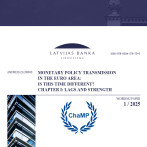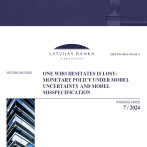Is it worth refinancing a housing loan?

In Latvia, interest rates on almost all housing loans consist of two components: 1) the base rate, typically tied to the EURIBOR rate, and 2) an individual bank mark-up reflecting loan risk and other factors. While recent interest rate fluctuations reflect changes in the EURIBOR rate, Latvia's consistently high lending rates stem primarily from relatively high bank mark-ups compared to other euro area countries.
But there's a glimmer of hope: mark-ups have been steadily declining, as shown in Chart 1. While still exceeding those of other euro area countries, the trend is encouraging. In 2014, borrowers faced an average mark-up of 2.8%, dropping to 2.0% by 2023. This seemingly small shift translates to significant savings. For instance, a 0.8% lower rate on a 100,000-euro, 25-year loan translates to 10,000-15,000 euro less in interest paid. [1]
Lower mark-ups hold an advantage for existing borrowers: a chance to refinance their loans at better rates. This practice, common elsewhere in the advanced world, allows the borrowers to capitalize on their reduced risk profile. After all, regular on-time monthly payments decrease the remaining loan amount (principal) and demonstrate the creditworthiness of the borrower. As the loan becomes less risky, borrowers deserve lower interest rates. Unfortunately, this refinancing potential largely remains untapped in Latvia. The European Commission has concluded that only 2% of those who would benefit from refinancing in Latvia actually do it. [2] This figure ranges from 13% up to even 35% in other EU countries.
The story is not about a couple of loans. Our estimates suggest that theoretically over a third of Latvian mortgage holders could financially benefit from refinancing. Of course, it is naive to think that all those who find refinancing beneficial would actually refinance their loans. Some may find the potential savings to be too small to offset the time and efforts necessary for finding a more favourable offer. Others might value existing relationships with their bank, and even more favourable terms and conditions would not persuade them to switch banks. Still, even if only those with savings above 1,000 euro refinance, millions of euros would be collectively saved on interest payments. So, the question remains: why is loan refinancing so rare in Latvia?
Two major hurdles block Latvians from refinancing: information gaps and high costs. First, advertising bans prevent banks from actively engaging in customer poaching, unlike in sectors like telecommunications. This leaves many unaware of refinancing opportunities. Second, the process itself incurs substantial costs, including commissions for both new and old banks, duties, and notary services. For a 50,000-euro loan, these costs can reach 1,300 euro, a hefty upfront payment compared to the gradual savings accrued over years.
Therefore, the low refinancing rate in Latvia makes sense given the limited information and high costs involved. Thankfully, positive changes are on the horizon. New amendments will soon ease advertising restrictions, and significantly slash refinancing costs by eliminating certain fees like bank exit commissions and Land Register duties.
These reforms hold immense potential to benefit Latvians by opening doors to potentially significant savings. Firstly, by removing obstacles to active customer poaching by banks and other lenders, competition will increase, potentially leading to more favourable terms and conditions and more attractive services for borrowers. Secondly, the loan refinancing costs will be considerably lower. For example, the refinancing costs for a 50,000-euro loan will be reduced from 1,300 euro to 700 euro, making refinancing more accessible. Thirdly, this is expected to result in a notable increase in the number of people reaping financial benefits from loan refinancing.
The fact that about 48% of borrowers would be financially motivated to refinance their housing loans in accordance with the regulation serves as an illustration of the last point (Chart 2). Assuming once again that only the borrowers whose savings would be at least 1,000 euro would refinance their loans, total savings would constitute almost 90 million euro.
Removing the advertising ban and simplifying refinancing could also attract new lenders to the Latvian lending market. If a new player were to emerge ready to offer slightly more favourable terms and conditions than the ones prevailing in the market, savings may be even higher. An additional 0.1 percentage point reduction in lending rates has a potential to save borrowers up to 30 million euro more in interest payments. So overall, the maximum savings might theoretically reach even 120 million euro.
Furthermore, like in the case of telecommunication services, the threat of competition can motivate the existing bank to offer a better deal. This scenario is even more beneficial for borrowers as they avoid the upfront costs associated with switching banks.
Of course, it is somewhat naive to expect that even the borrowers who might save quite a lot from refinancing loans will unquestionably do so. A thousand euro over a decade translates to small monthly gains, and the time and effort involved might not be worth it for some. Likewise, banks also have to be willing to poach customers and be active in pursuing this objective. ls this going to happen? It's difficult to say – this should be the case when competition is fierce. Regardless, these scenarios provide a good illustration of the fact that the easing of the loan refinancing process can bring tangible benefits for quite a large part of the public.
However, this is unlikely to happen this year. The recently adopted amendments to the Consumer Rights Protection Law, which provide for compensation of 30% of total loan interest payments, apply only to the loan agreements concluded by 31 October 2023. Since a new agreement is signed when refinancing a loan, the borrower would not be eligible for compensation anymore. This is important for the current borrowers who have to keep an eye on this aspect to avoid financial losses. Consequently, it is unlikely that we will see benefits already in 2024.
[1] Benefits depend on the chosen repayment schedule.
Textual error
«… …»





